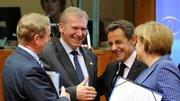Bailout rate cut may cost more in long term warns economist

Euro zone leaders have agreed a cut in the rate of interest being paid on the Irish bailout at an emergency meeting in Brussels yesterday.
Speaking after the announcement was made Taoiseach Enda Kenny said that this agreement “marks an improvement in the programme of support” which “ultimately it reduces the cost of our debt, thereby lightening the burden on the tax payer”.
The deal has been described as good deal for Ireland, and consensus among delegates in Brussels is that Ireland has benefitted significantly. The interest rate will probably be cut from the current 6% to between 3.5 or 4%. In addition Ireland will have at least 15 years to repay this, and this could even extend to 30years if necessary.
According to the Taoiseach this will result in savings of between €600 and €800 million for Ireland.
However he was also quick to point out that these savings would not be reflected in December’s budget. Although there will be benefits for the Irish Taxpayer “it won’t have a direct effect on this budget,” Kenny said. “We still have a massive budget deficit… that still means a very tough budget for Ireland”.
The new deal means that a second bailout for Ireland is "off the table" the Minister for Finance Michael Noonan said today.
However some commentators were less celebratory of the deal. Speaking on Morning Ireland this morning, Independent TD Shane Ross said that the best thing about this deal is the fact that “it puts default on the table.” As a Greek default is now seen as inevitable, Ireland is also in a position where it could consider defaulting. “The markets are reacting positively to this,” Ross said,“ which shows that they are not as frightened of default as we thought. Default is no being seen as a solution, rather than another problem.”
Ross highlighted the fact that “the ECB has conceded,” on the possibility of and a as result “default can be painted as positive in some circumstances”
Also speaking on Morning Ireland, Fianna Fáil Finance Spokesman Michael McGrath said that while “This is good news for Ireland” It isn’t giving us “additional cash to reduce austerity measures in the budget.” Rather it is “just money that we aren’t going to have to spend.” McGrath said that “people won’t see a direct saving form this.”
Ross agreed on this point, saying that “even with this cut we are still carrying a huge amount of debt which it is doubtful we will be able to pay. People on the ground are going to suffer appallingly”.
Economist Constantin Gurgdiev is also highly critical of the deal. Speaking on TV3’s Tonight with Vincent Browne yesterday, Gurgdiev said that the real problem is the fact that “he EU deny there is a problem in other countries outside Greece” and these solutions are primarily a short term solution aimed at resolving the Greek financial crisis. The fact that the deal has “doubled the maturity of these loans means that we have increased our payments more than we are going to save” Gurgdiev said.
In addition to this the banking sector has not been resolved. According to Gurgdiev “The 6 Irish banks still owe 70 billion to the ECB, and 55 billion to the Irish central bank, all of this debt is still on the shoulder of the Irish economy, and ultimately on the Irish tax payers themselves.”
Gurgdiev said that by “2014 we will see Ireland and Portugal in the same position Greece is in today. The only thing which will prevent this is the possibility that Spain and Italy get there before us.”
